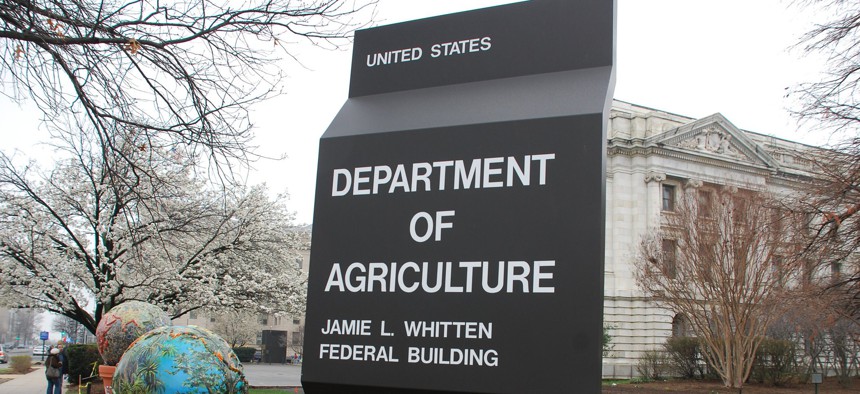States Must Plug Into Federal Antifraud System for Food Aid Under New Rule

Adam Fagan/USDA
The system, meant to help prevent duplicate participation, is expected to make enrollment and oversight easier with the Supplemental Nutrition Assistance Program.
The Department of Agriculture is set to publish a new interim final rule on Monday that will require states to plug into a new, interstate data system designed to rework how states prevent so-called duplicate participation – where someone gets benefits in more than one state at a time – in the Supplemental Nutrition Assistance Program, or SNAP.
The system, called the National Accuracy Clearinghouse, has been in the works for years.
Although it's meant to help cut down on duplicate participation in the program, the department is also hoping to reap efficiencies and better experiences for staff and participants alike.
Congress mandated that USDA require states to use such a system in the 2018 Agriculture Improvement Act, commonly known as the Farm Bill.
USDA started working with 18F, a digital service team in the General Services Administration, to build the system in fiscal year 2021. IT company Ventera won a contract to continue developing and eventually roll out the system, and ITCON Services will be running a help desk. The system will be hosted in USDA's cloud environment and maintained by USDA staff and contractors.
Now, the department will be working with states to connect them to the new system over the course of five years, said Rebecca Piazza, senior advisor for delivery at USDA's Food and Nutrition Service, which runs nutrition programs including SNAP.
First up are Iowa, Louisiana, Massachusetts and Montana, which will be adopting the system early next year. They and other states are going to have to make tech, policy and process updates to be able to use the system, said Piazza, adding that USDA has a support team ready to help.
Congress appropriated $5 million to develop and roll out the clearinghouse and interim final rule. On the state side, individual states and USDA will each be on the hook for half of the cost, she said.
The project is building off of a five-state pilot started in 2013 with a system run by Lexis-Nexis, according to a 2015 report about that pilot. Some states are still using that system, but eventually all are going to move to the new clearinghouse, said Piazza (the website of the Lexis-Nexis clearinghouse says that it's expanding into other programs including Medicaid).
The new data system is designed to cut down on the number of people who are somehow getting food stamps in more than one state. Estimated savings for national implementation come out to about $114 million annually, according to that 2015 report.
The rate of duplicate participation found during the pilot was less than 0.2%, said Piazza, and of that slice, fraud is "very rare."
Overall, the rate of improper payments in SNAP (a measure that includes fraud in addition to other errors) was about 7% in fiscal year 2020. That's much lower than some other government programs that saw high-profile spikes in fraud during the pandemic. The rate in the unemployment program was 18% the same year.
But Piazza says that USDA is also hoping that the new system will also make things easier for state workers who run SNAP and for people receiving benefits.
"In a lot of instances, preventing fraud and providing good customer experience can sometimes be in tension and you have to figure out where the right balance is," she said. "This is something that I think is one where, fortunately, that's not the case. It supports both goals."
Currently, it's the responsibility of individuals receiving SNAP to contact the state they're leaving to tell them that they're moving states.
Sometimes forgetfulness, difficulty getting in touch with state offices, or state delays disenrolling someone can be the culprit of double payments across states. Even "diligent" people who call help desks might face "a long whole time for that help to try to disenroll," said Piazza.
Currently, states use manual, ad hoc processes to check for duplicate payments (which they're already required to do) and fix any issues – think phone calls and emails. The new clearinghouse is meant to centralize and standardize the process.
And although the new system doesn't remove that burden from individuals to disenroll from SNAP when they move, it is meant to be an "extra check," said Piazza. States will be on the hook for resolving any findings of duplicate enrollment within 10 days.
"This really moves the responsibility from primarily being on the participants' shoulders to this NAC system for helping identify these instances, so that we can ensure that duplicate participation is prevented, that we get people benefits in the right state quickly and that we assist them with this task of enrolling in the right space," she said.






